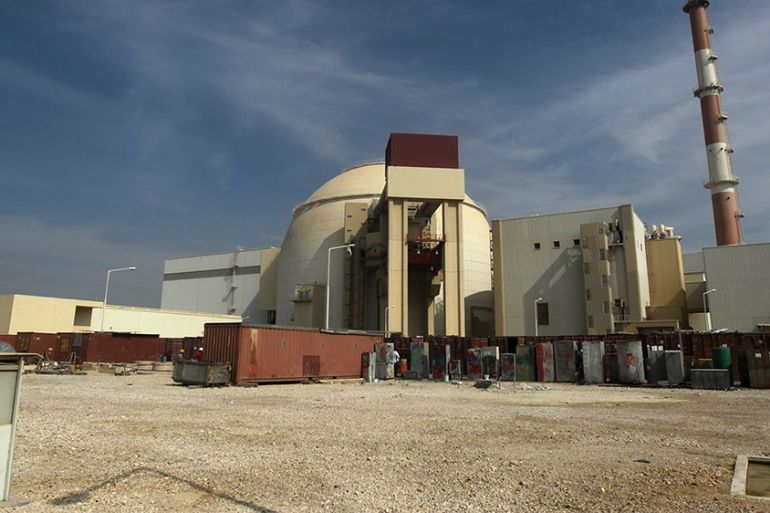Iran begins constructing second nuclear reactor at Bushehr plant
New reactor – and a third planned to be built – will each add more than 1,000 megawatts to Iran’s power grid.

Iran began constructing a second nuclear reactor at its Bushehr power plant – a facility being fuelled by uranium enriched further than the limits outlined in the faltering 2015 nuclear deal with world powers.
While celebrating the start of construction on Sunday, Iranian officials also condemned United States pressure campaign of sanctions that blocks Tehran from exporting its crude oil.
Keep reading
list of 4 itemsBombs and viruses: The shadowy history of Israel’s attacks on Iranian soil
Russia says Ukraine attack hits Zaporizhzhia nuclear power plant
Nuclear energy cannot lead the global energy transition
On Sunday, trucks with spinning concrete mixers poured their slurry into the prepared base of the second reactor as journalists watched in Bushehr, some 700km (440 miles) south from Iran’s capital, Tehran. Bushehr’s working reactor stood behind it.
Officials said the new reactor – and a third planned to be built – will each add more than 1,000 megawatts to Iran’s power grid. It is being built with the help of Russia, which helped finally put Bushehr’s first reactor online in 2011 after decades of delays.
“Nuclear power provides reliable electricity … and each power plant saves us 11 million barrels of oil or $660m per year,” Ali Akbar Salehi, head of the Atomic Energy Organization of Iran, said in a televised ceremony.
The sanctions were imposed after President Donald Trump unilaterally withdrew the US from the historic nuclear accord in May 2018, lighting the fuse for the current tensions now gripping the Middle East.
“It was not us who started breaking commitments, it was them who did not keep to their commitments and cannot accept the nuclear deal as a one-way roadmap,” said Salehi.
Bushehr works with uranium produced in Russia, not Iran, and is monitored by the United Nations‘ International Atomic Energy Agency (IAEA). However, Iran began 4.5 percent enrichment in part to supply Bushehr despite the deal limiting it to 3.67 percent.
While that is still nowhere near weapons-grade levels of 90 percent, nonproliferation experts warn Iran’s growing stockpile and increasing enrichment will begin to shave off time from the estimated one year Tehran would need to gather enough material for an atomic bomb.
Iran long has maintained its nuclear programme is for peaceful purposes, but the deal was designed to limit its enrichment in exchange for the lifting of international sanctions.
Allegations rebuffed
Also on Sunday, Iran’s foreign ministry spokesman rejected claims by the US and Israel over allegations of nuclear material being discovered at an undeclared site outside of Tehran.
An IAEA meeting last week appeared to include discussions over what Israeli Prime Minister Benjamin Netanyahu described in a US speech in 2018 as a “secret atomic warehouse”.
The IAEA has said Iran “carried out activities relevant to the development of a nuclear explosive device” in a “structured programme” through the end of 2003. Israeli officials allege material recovered from the warehouse came from that programme.
“The Zionist regime and others are trying to reopen this case. We don’t accept this and we condemn these efforts,” Mousavi said.
“We have announced that this is a trap,” he said. “Hopefully the IAEA will maintain its vigilance.”
Iran previously denied the claims about the warehouse by Israel, which has its own undeclared nuclear weapons programme.
The IAEA released no information on the alleged warehouse at a board meeting on Thursday, but is expected to release a quarterly report on the Iran nuclear deal this week.